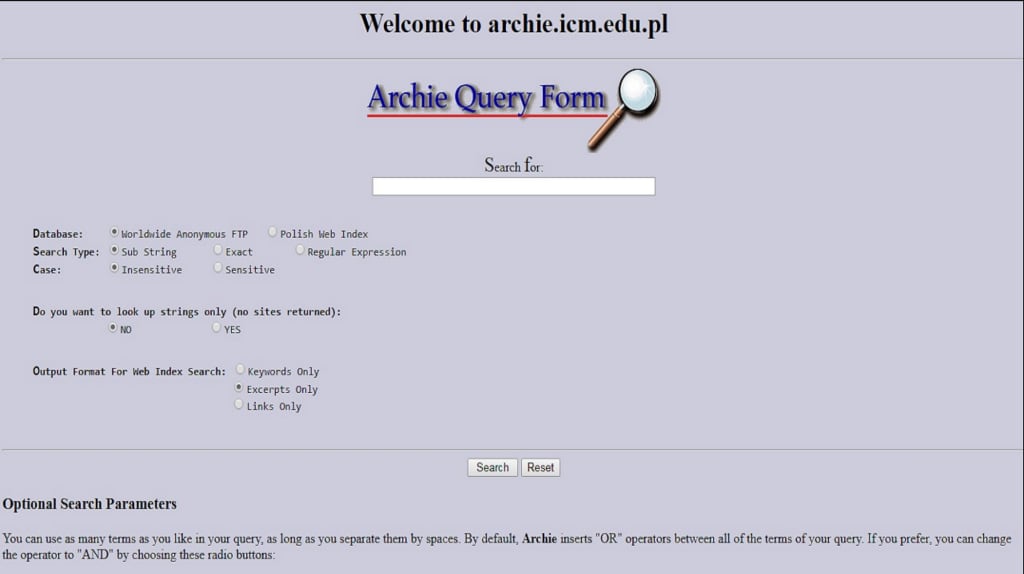
Today, search engines are an indispensable part of navigating and finding information on the internet.
Hard to believe that it's only been a little more than a couple of decades with Google and co.
With the ability to instantly search billions of webpages, modern search engines like provide tremendous utility for internet users.
This was not always the case. Before the rise of search technology, information online was largely decentralized and difficult to discover efficiently.
This changed with Archie, the pioneering first search engine created in 1990 that evolved how people accessed content on the early internet.
The internet before search engines
In the 1980s and early 1990s, the internet was still in its infancy.
While networks and protocols like TCP/IP and FTP allowed computers to interconnect, the World Wide Web had not yet been fully developed.
Most online activity centered around FTP sites, which allowed users to access and download files.
FTP sites were run by universities, companies, governments, and tech enthusiast communities to share information and files with each other. Through FTP sites, early internet users could upload and retrieve everything from research papers and journal articles to software and datasets.
However, with no centralized index, locating a specific file required manually searching individual FTP sites one by one.
This time-consuming process severely limited the utility of the early internet as an information resource.
It was clear that some kind of searchable index would be needed to unlock the potential of the internet's decentralized information.
The challenges
In many ways, the problem facing early internet pioneers like Alan Emtage, Archie's creator, was similar to today's search engines trying to index the entire World Wide Web.
However, given the limited computing resources and network speeds at the time, creating a searchable index was highly complex.
Hard drive storage space, processing power, and network bandwidth were extremely limited compared to now.
Early search crawlers also had to contend with FTP sites disappearing or changing addresses frequently, requiring constant re-crawling.
The technical hurdles were significant, but Emtage was up to the challenge.
Bringing search capability to FTP indexing
In 1990, McGill University graduate student Emtage set out to organize the chaotic jumble of FTP sites through search technology.
He named his pioneering creation "Archie", shorthand for archive.
Archie worked by:
- Crawling known FTP sites and indexing the filenames found on each server
- Allowing users to search the index and retrieve matching filenames
- Providing a list of FTP sites where the user could download a particular file
Archie's indexing did not include the contents of files, only filenames. But this simple search capability made it far easier to track down files across the early internet.
No longer did users have to manually browse hundreds of FTP directories to find a specific file. With Archie, they could simply search for relevant filenames regardless of which server hosted it.
Gaining ground
After its public release in 1991, Archie quickly gained popularity in academic circles. Scientists, professors, and students embraced it as the first real search solution for navigating research papers and materials online.
While limited compared to modern search engines, Archie provided indispensable utility by enabling basic search functions.
As Archie grew, volunteer-run "Archie mirrors" emerged to share the workload of responding to search queries. These Archie clones allowed the system to scale to meet rising demand.
For early internet pioneers in academia looking to tap into the knowledge shared across FTP servers, Archie represented a transformative step forward.
Limitations and the evolution of web search engines
Despite its usefulness, Archie had a number of technical constraints that later search engines improved upon:
- It only indexed filenames, not the content inside files themselves
- The indexing was limited to FTP sites, not the emerging World Wide Web
- Search capabilities were very simple with little relevance ranking
With the World Wide Web taking off in the 1990s, new search engines emerged purpose-built for the unique features of websites and hyperlinked content.
Building on Archie's concepts, search engines like AltaVista, Yahoo, and later Google developed advanced algorithms and web crawlers to index the rapidly growing number of websites and pages.
While Archie's capabilities appeared primitive compared to modern web search, it pioneered the core functionality that subsequent search engines refined over time.
Archie proved the transformative power of search to organize online content and make it discoverable.
Archie's legacy
Today, internet search is dominated by a few major players that index massive portions of the web. But in the early 1990s, the idea of being able to search for content online was revolutionary.
By creating the first searchable internet index, Archie paved the way for the powerful search utilities we rely on today.
Search overcame the early internet's decentralization to make the online world more useful and navigable.
Most internet users today are unfamiliar with Archie, but it represents an important milestone in the internet's history.
Archie was the starting point of getting access to a world of information with a click.
---
A writer is nothing without a reader! So, if this story was in any form meaningful or helpful to you, it meant the world to me if you took 5 seconds out of your day to share it. And if you could see yourself reading more from me, become my very dear email friend.






Comments
There are no comments for this story
Be the first to respond and start the conversation.